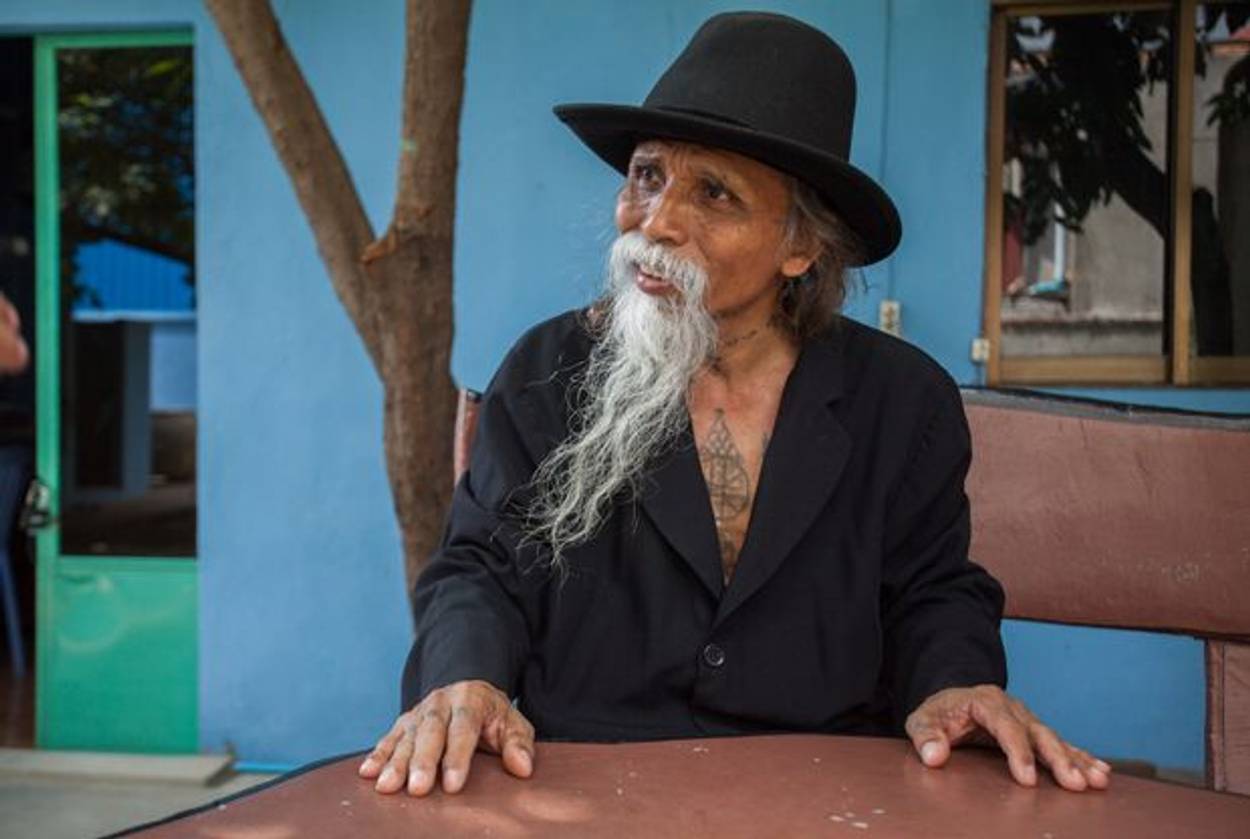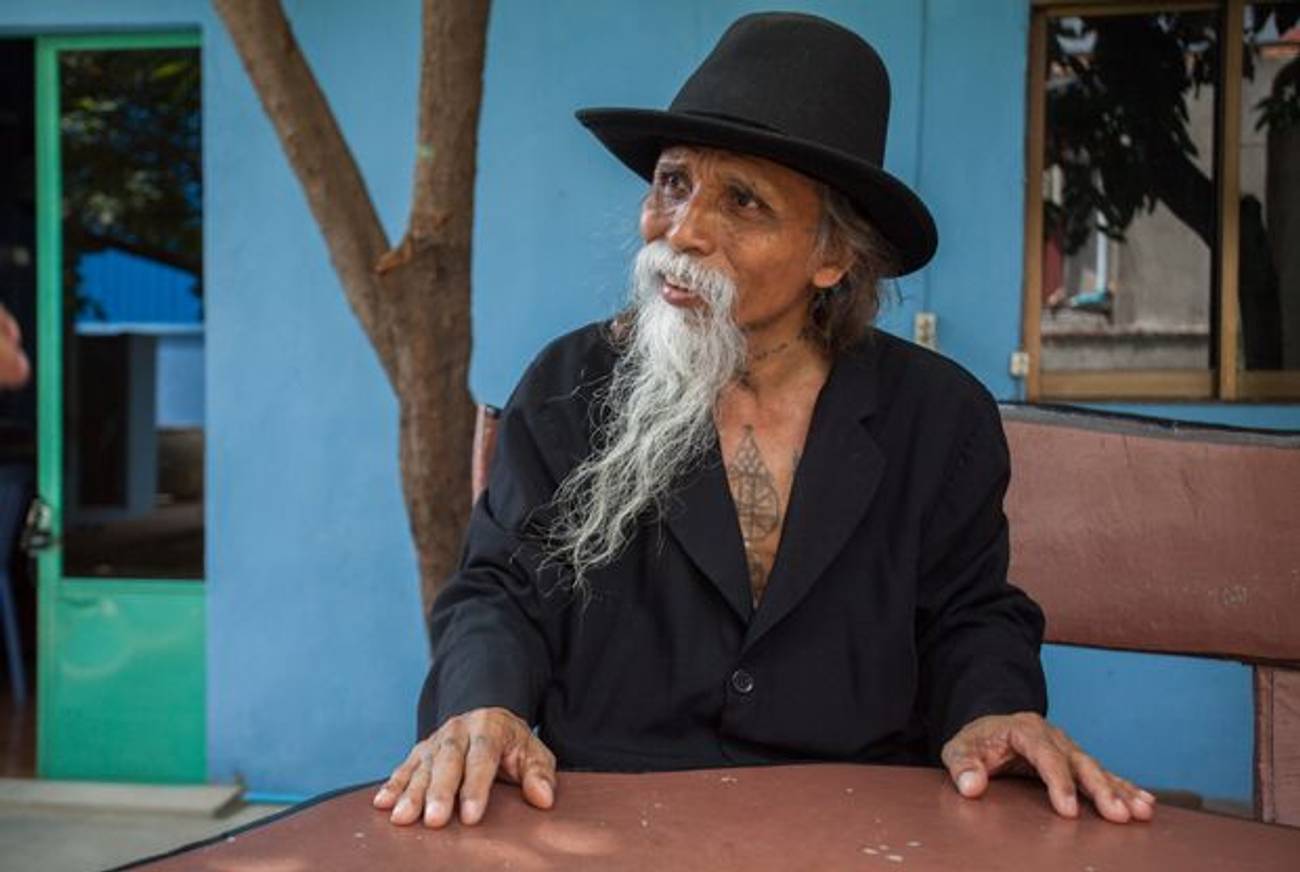Breaking the Fast With a Cambodian Rabbi
David Adollah, who grew up in Phnom Penh, says God came to him in a dream




At the end of Yom Kippur, the Chabad house in Phnom Penh plans to hold a dinner for about 60 people in the Cambodian capital, mostly working professionals who make up the city’s small Jewish expatriate scene. But on the other side of town and over the Tonle Bassac river, there will be another, no-frills breaking of the fast by a man who claims to be the only Cambodian rabbi—something distinctly different from being a rabbi in Cambodia. That man, Rabbi David Adollah, leads a group of Cambodian converts to Judaism. Thirty years ago, he had a dream in which God told him to establish a Jewish kingdom in Cambodia. Over three separate visits this summer, I took stock of his progress.
Adollah, whose Cambodian name is Hang Pith, lives in a house off a poorly paved road in southeastern Phnom Penh’s Meanchey district. When I first arrived, a hunched, elderly Cambodian woman wearing a black dress and black head covering hailed me from the street. I would soon learn that she was Sok Chamnab, a 60-year-old widow and one of the first members of Adollah’s congregation. We entered the garden through a gate adorned with six-pointed stars on the frame. Out sauntered the Cambodian rabbi, a short, taut man with sunken cheeks and an intense stare. He had a silver mustache connected to a long wispy beard that draped down to his chest. Salt and pepper peyot dangled from under his yarmulke and black hat. He wore a knee-length black coat. He later explained that, lacking the proper Judaica clothing stores, he’d assembled the outfit himself with scissors and material bought at the local market.
We sat down at a wooden table and started talking. But before I could launch into interview mode, he wanted to ask me a question. He wanted to know my religion. The “I’m Jewish” response went through translation. He beamed, and began to tell me his story.
Adollah, now 65, grew up in Phnom Penh, one of five siblings. His exposure to religion started early. His father was Buddhist, his mother Catholic. Though he repeatedly told me that his life-altering dream taught him everything he needed to know about his new religion, it occurred to me that he must have absorbed some details about Judaism, or at least the Israelites, from Biblical tales. His conversion story had touches of the most famous Jewish dream of all time: Jacob and his ladder. The way he tells it, however, his trajectory towards Judaism was almost inevitable, a spiritual search set into motion at a very young age.
From adolescence into young adulthood, “I loved Catholicism, but didn’t completely adhere to it,” Adollah told me.
Soon, it wouldn’t matter. The militant communist regime known as the Khmer Rouge evacuated Phnom Penh on April 17, 1975, moving everyone out to the countryside and into the fields. The regime held power for almost four years, killing nearly two million people through starvation, overwork, disease, and execution. Educated members of society were essentially marked for death, and city dwellers were scorned as “new people,” unlike the uncorrupted “base people” from the provinces.
Religious groups weren’t spared. The Khmer Rouge razed a beautiful church in Phnom Penh, defrocked monks, executed the head of the Buddhist community, repurposed temples into prisons, and killed thousands of Cambodia’s Cham Muslims. After the city was evacuated, the Cambodian poet U Sam Oeur recalls passing by six monks put to work hammering away at an American-built bridge. He asked one of them, a reputed Pali scholar, what was happening. The monk said that the Khmer Rouge didn’t need capitalist bridges.
Amid the upheaval, the future rabbi was sent northwest to Battambang province to work at an agrarian site—the revolutionary leaders envisioned supporting the new utopia on large-scale farming. Hang Pith, as Adollah was known at the time, buried his cross after a soldier pointed a gun at him and asked what he was wearing around his neck. In 1976, Adollah was working in the fields when soldiers came to arrest him and his brother, accusing them of serving in the former government’s military—a death sentence.
“There were ten soldiers surrounding us,” Adollah recalled. “And one of them took a chain and beat my brother until he was unconscious next to me. They pulled my hair and hit every part of my body very hard, but it seemed nothing was happening to me and I did not feel hurt at all,” he said. “When they held a knife up against my throat, I recovered myself and shouted at them, ‘Do not kill me! What is my fault?’ I prayed to the highest power, God. I told them that I was not a soldier, I was just a student.”
Their tormentors tied them to a tree, promising they’d be back to finish the brothers off after lunch. It never came to that. In a sudden reversal of fortune, they were freed. Adollah was later told that his father had heard about the arrest and used all the connections he could think of to beg for their lives. But Adollah has a different explanation: “I think it was due to the power of God that I survived. But I didn’t know which kind of God helped me at the time.”
His search for a spiritual path would soon end. After the Vietnamese swept the Khmer Rouge out of power in early January 1979, Adollah moved back to Phnom Penh and resumed a normal existence. He traveled with his then-wife to work in a market in the southwest. One day in 1983, a transaction went awry and a customer cursed him. He fell ill, and prayed for three days until he had his dream, the moment he “felt God come into my spirit.”
“God asked me to build a place, a Jewish Kingdom, in Cambodia without joining with other sects,” Adollah told me the first time we met. “God told me that I’m part of the Jewish race.”
He changed his name, moved back to Phnom Penh, separated from his wife, and started attracting followers. But in the 30 years since, progress has been slow. At the most, he’s had about two dozen members, which at last count dwindled to no more than a dedicated eight.
When I first heard about Adollah, I thought I’d stumbled on an amazing story of a secret Jewish community in Cambodia. In my hasty quest to dig deeper, I sent embarrassing emails titled “Jewish presence in Cambodia?” to respected historians of the country. The most I discovered was a reference to a Spanish missionary’s bogus theory that Jews had built temples around Angkor Wat.
Adollah’s son, 34-year-old Hang Samnang, who speaks English and has taken the name Moses, said there was nothing for the community to build on.
“We didn’t have help from the outside,” Moses explained to me on my second visit. “He started this by himself. So we consider him a rabbi.”
For a self-proclaimed rabbi, though, Adollah has a vague grasp of Judaism, as though he were teaching himself the religion on the fly, cutting out the pieces he likes the same way he makes his own outfits. He doesn’t eat pork and has a list of Jewish holidays, but he also routinely crosses himself before beginning his services. He has no certifiable rabbinical training, speaks very little Hebrew and doesn’t know basic prayers. He’s fasting for Yom Kippur, but he seemed less enthused about Rosh Hashanah. He’s also the only rabbi I’ve ever met who has tattoos, faded relics on his knuckles and chest from his pre-Jewish life. He knows that rabbis and tattoos don’t typically go hand in hand. Perhaps out of embarrassment, he avoids talking about them.
At the two services I attended, Adollah’s small flock sat on folding chairs in a room separated from the yard by a low concrete wall. Everyone was dressed in black. Adollah had a collection of what appeared to be black cowboy hats, curved brims and all, which he asked all the men, including myself, to wear. Phones rang, including the rabbi’s, who made and answered calls in the middle of his service, at times in the middle of his sermons. Interruptions weren’t a problem. The service consisted largely of the congregation singing songs—which Adollah had composed—and listening to him read from a Khmer Bible.
“People in Cambodia, they say, what is a Jew?” Moses explained to me. “They think we believe in Jesus Christ, but we don’t, we believe in Judaism.”
It seems that Adollah is, after all, an anomaly, but an anomaly that raises a series of interesting questions. If his legacy does continue, it will pass on to Moses, who plans to follow in his father’s footsteps. He has vowed to raise his children, whom he calls Judah and Joshua when not addressing them by their Cambodian names, as Jews. I wish him luck—I have a feeling he’s going to need it.
Joe Freeman is a Southeast Asia-based journalist whose work has appeared in The Washington Post, Foreign Policy, The Guardian, The Christian Science Monitor, The Phnom Penh Post, and the Nikkei Asian Review.